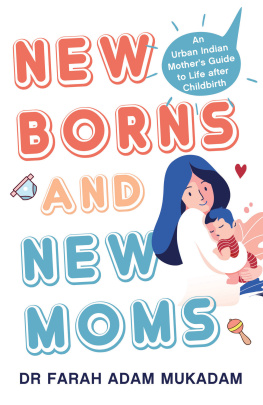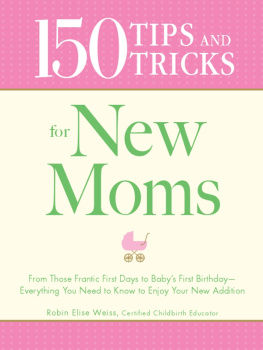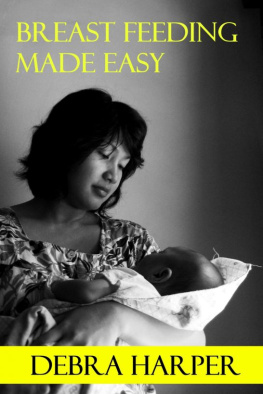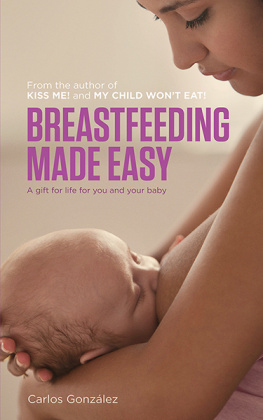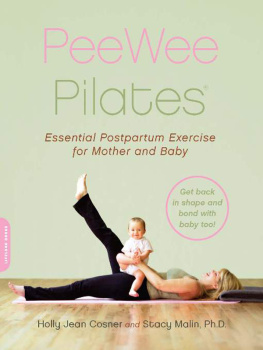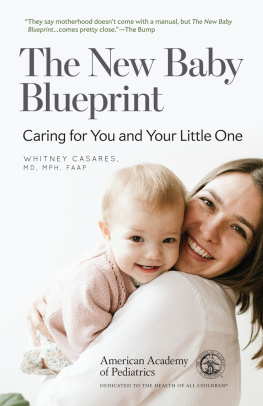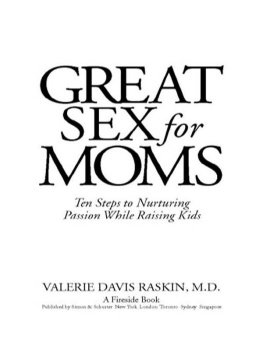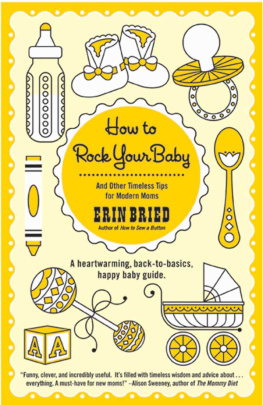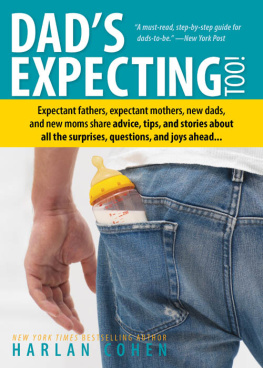To my tone-deaf father, who had great faith in my singing skills. Your conviction in my endeavours has always kept me going.
May you rest in peace, Pappa.
CONTENTS
Guide
1
TAKING CARE OF THE NEW MOTHER
Being a mother is one of Gods greatest blessings. It might be difficult to see how fortunate you are when you are going through endless diaper changes and struggling with engorged breasts and backache. But once the daunting first two months after delivery are over and you have adapted yourself to motherhood, you will begin to enjoy this journey with your new life partner: your child! There is a chance that you may relive your childhood through the eyes of your baby and truly appreciate this time. The first few years with your baby will be tiring, without a doubt, but it will be the golden period for you. No one is ever going to shower you with the abundant adoration with which your little one will. You will appreciate these little things in retrospect, as I do now. The cuddles and snuggles and the endless laughter over a simple peek-a-boo are what that make the life of a mother richer. The feeling of a connection with your baby, once you have mastered breastfeeding, compares to nothing else. In this book, I will take you through the ups and downs you will face as a new mother. But dont let the challenges bog you down. If you are expecting or planning a baby, or just had one, then you are reading the right book.
When I was pregnant, the idea of a human being coming out of me was just terrifying! I had not anticipated that the real hardships of a woman begin after the baby is born. Apart from all the physical and emotional problems that befall on us after delivery, we are also subjected to conflicting advice from our doctor, granny, mother-in-law, mom, other mothers and of course, the Internet. Should I cover my head at all times because my mother asked me to? Is the masseuses massage actually any good or is it just breaking my bones? Should I pour oil on my babys head? There are so many opinions out there but very little wisdom to be found.
In a typical Indian household that has welcomed a new baby, there is a huge change in the mothers daily life. She is massaged daily, served fresh food before everyone else, asked to stay indoors and not allowed head baths at least for a couple of weeks. These instructions and restrictions have been a part of the wisdom passed down from one generation to another. They had kept new mothers hale and hearty. But now jump to the present day and youll see todays superwomen juggling jobs, homes, babies and their sanity. They have no time for themselves and no one to guide them but the Internet. This cocktail is ruining their health. It is time they revisited old traditions to look into the logic behind some of them. In this chapter, I will throw light on the logic behind the wisdom passed down through generations hidden beneath technical jargon in scientific journals.
The Forty-day Confinement Period
The first six weeks are a critical period for a new mothers recovery, and she is confined to her room during this time. In Chinese culture, it is called sitting the month and in Hindi it is known as chhilla. All my patients have complained about this confinement period. After the first two weeks of sitting holed up in one room, a woman starts to lose her mind. There is a baby sucking at her breast pretty much 247, the milk and sweat makes her sticky, she is perpetually oily, her food is bland, and she hasnt felt fresh air on her body in weeks. I, for one, was dying to step out of this security prison that my home had become after my delivery. In fact, the forty-day sabbatical is so extreme in some cases that there was a woman who was not allowed to even talk to her husband in that period. She was literally sentenced to solitary confinement by her mother-in-law. Years later, when her friend had delivered, instead of congratulating her on the new baby, she ended up sobbing in front of her recalling how tormented she had felt during her confinement period.
There are plenty of parenting websites and blogs saying that you can take a stroll in the park two weeks after delivery to get some fresh air. Before I debunk the myth that it is okay to step out before the forty days, let me remind you that the country where this advice comes from has no paid maternity leave (the country is the Unites States). So, dont take advice from them regarding the confinement period!
New moms are often reluctant to comply with this advice because the explanations given by the nanis and dadis for the sabbatical are quite creative and not so scientific. They say things like youll get affected by the evil eye (nazar lagna) or the cold air will enter your bones (haddiyon main hawa utarna). For want of logic in their justification, lets not discredit their suggestion just yet. Similar advice, and might I add, reasoning, are seen in every other culture that has been around for more than 1000 years (such as the Mediterranean, Chinese and Latina). And as for the Americans, they have a heritage that is barely 300 years old. So, who should we listen to?
We have at some point experienced that our immunity is much lower during pregnancy. We are more prone to colds and need way more rest to recuperate. It is because the developing foetus is a foreign body and the immune system has to mount a reaction against it to eliminate it. However, this is our little baby and the body knows that it must preserve it. While the embryo gets implanted, there are changes in the uterus that allow the pregnancy to progress unharmed by the bodys immune attack. Your immunity is, in fact, lowered to favour the accommodation and development of the foetus. This state of lower immunity continues after delivery too. The process of birthing and shrinking of the uterus causes more stress to the body and a woman takes anywhere from three months to a year to completely get back to her pre-pregnancy immune levels.
One of my friends told me that she used to go to work daily and was thriving during her pregnancy. Apart from the occasional cold and heartburn, she never had any issue. She was confused about the hype around low immunity after delivery and wondered why she couldnt go out like she did while she was carrying.
I am glad she asked.
After the birth of the child, the body works overtime to repair and restore its normal self. Some womens bodies take the slow and steady path to recovery. While in others, the immune system which was suppressed during pregnancy takes a sharp U-turn bringing the body at the crossroads of suppressed immunity of pregnancy and the normal immunity of the non-pregnant state. This is known as the Immune Reactivation Syndrome. Each womans body gets back on track differently, and you could be anywhere between the two extremes.
In Immune Reactivation Syndrome, the immunity follows a rather drastic recovery course and goes into overdrive. In order to protect your bodys reactivity from going into a frenzy on coming in contact with every virus and bacteria, it is strongly advised that you sit it out in your room and be looked after. Taking a walk in the park daily is out of question. Maybe a short visit to the hospital for a check-up is okay. I hope that in the coming years, this important aspect of maternal care will come into the limelight and new mothers will get home visits rather than be asked to come to the hospital.

